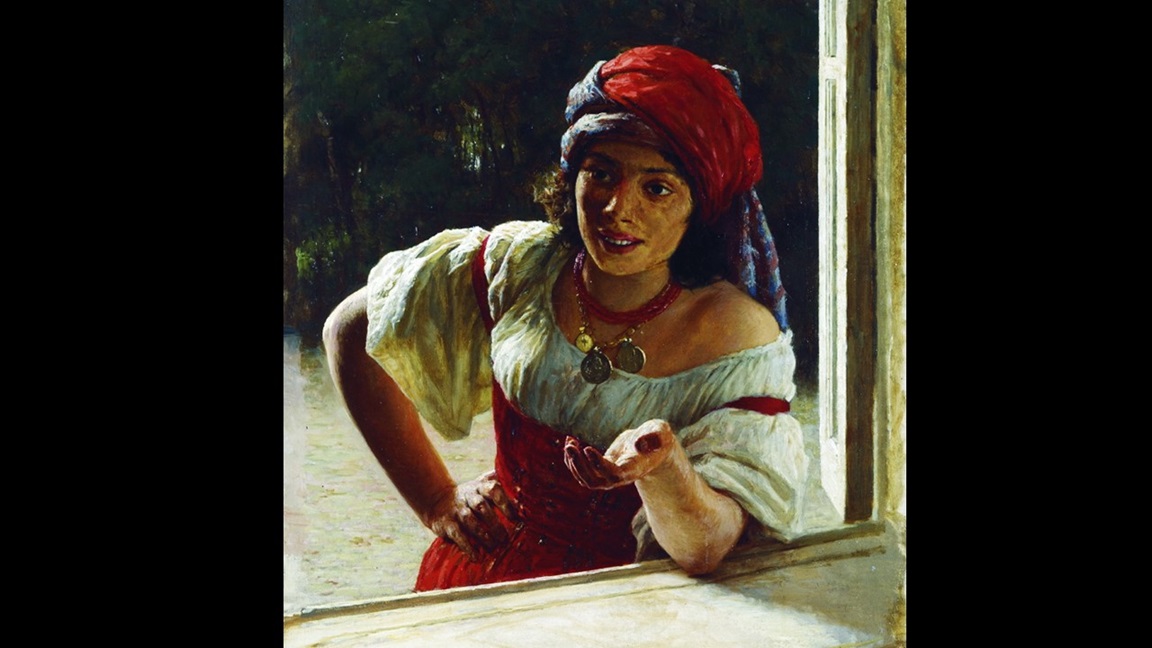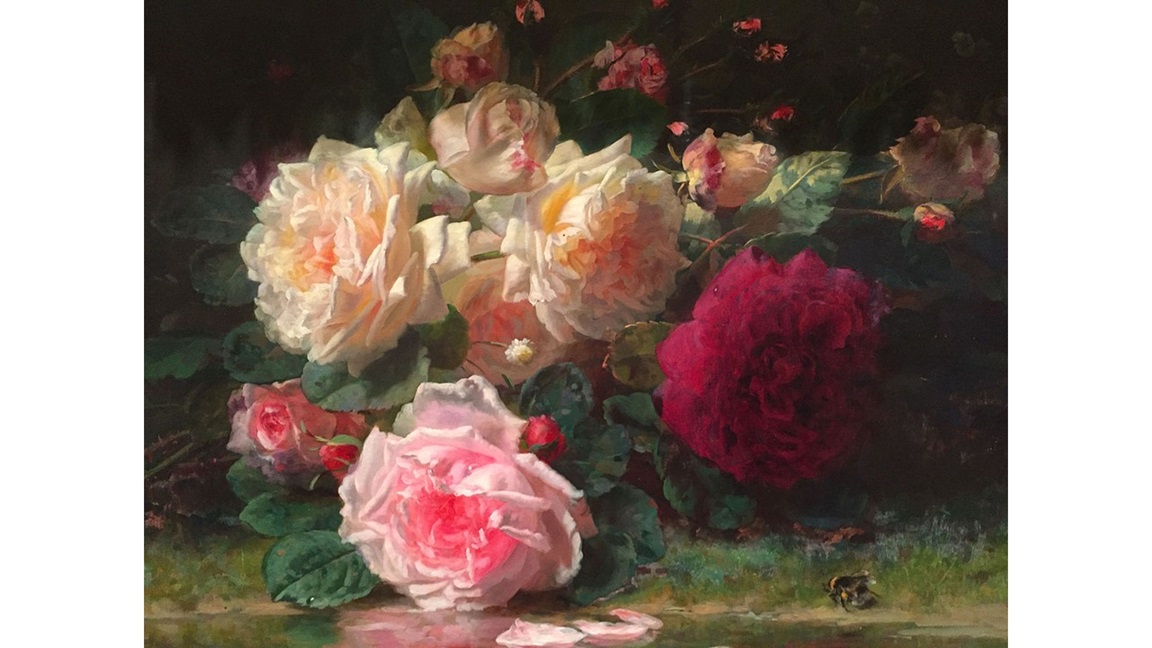.
Carmen
by Théophile Gautier (1811-1872)
translated by Bruce Phenix
Carmen is thin—a dark-brown line
Of bistre rings her gipsy eye.
Her black hair bodes a dark design,
The Devil gave her skin its dye.
She’s ugly, every woman feels,
But men all find her madly sweet:
Toledo’s great Archbishop kneels
To sing his mass before her feet;
For on her tawny amber nape
Is twisted an enormous bun,
Which makes her dainty body’s cape
When in the alcove it’s undone.
And laughing with triumphant power
A mouth bursts out amid her pallor;
Hot red pepper, scarlet flower,
The crimson blood of hearts its colour.
Thus made, the blackamoor defies
The haughtier beauties in delight,
And with the warm glow of her eyes
Revives the sated appetite.
Her piquant ugly features keep
A grain of salt from that sea whence
The acrid Venus of the bitter deep
Sprang in her naked impudence.
.
Original French
Carmen
Carmen est maigre, – un trait de bistre
Cerne son œil de gitana.
Ses cheveux sont d’un noir sinistre,
Sa peau, le diable la tanna.
Les femmes disent qu’elle est laide,
Mais tous les hommes en sont fous:
Et l’archevêque de Tolède
Chante la messe à ses genoux;
Car sur sa nuque d’ambre fauve
Se tord un énorme chignon
Qui, dénoué, fait dans l’alcôve
Une mante à son corps mignon.
Et, parmi sa pâleur, éclate
Une bouche aux rires vainqueurs;
Piment rouge, fleur écarlate,
Qui prend sa pourpre au sang des cœurs.
Ainsi faite, la moricaude
Bat les plus altières beautés,
Et de ses yeux la lueur chaude
Rend la flamme aux satiétés.
Elle a, dans sa laideur piquante,
Un grain de sel de cette mer
D’où jaillit, nue et provocante,
L’âcre Vénus du gouffre amer.
.
.
Bruce Phenix worked as a civil servant in England from 1983 until his retirement in 2021, in various administrative roles in transport and environment. He has a longstanding interest in foreign languages and other cultures and his translations have been published in numerous, including in the Norton Anthology of World Masterpieces. He also has extensive experience, over a period of 35 years, in giving English language support to students from Far Eastern backgrounds. He won the Yeats Club’s 1989 Catullus Award for the best translation from an ancient language.

















It’s a lovely translation, Bruce.
With “bistre,” “tawny,” “amber,” “blackamoor,” and “pallor,” it sounds like Gautier couldn’t make up his mind about her coloring.
Mary, I really appreciate for your kind and positive reaction to the translation. I agree with you about the wide variety of Gautier’s colour words!
A gorgeous translation, Bruce. As Mary Gardner remarks above, Gautier seems to feel ambivalence about Carmen. She is at once ugly and unexpectedly attractive. I like what he does (and what you reflect) by suddenly suggesting that the dark-skinned gypsy possesses a certain pallor–but such is quite true of her face when her red-hot mouth opens. The ambivalence extends even to Venus in the concluding stanza showing the bitter and salty likeness of gypsy and goddess.
Margaret, Thank you so much for your generous and perceptive remarks. I’m flattered that you like the translation and always value your poetic analysis!
While I am not a French linguist, translation of “noir sinistre” (darkly sinister, the most likely exact words) into “dark design” is a great description within the confines of the poem achieving both the perfect rhyme and intended portrait of Carmen. Translations like yours keep the past alive and are great additions to classical poetry.
Roy, I very much appreciate your kind and interesting remarks. I’m delighted that you see value in the translation.
This has got to be one of the best translations ever published at the SCP. The faithfulness to the original text is superb; the English meter follows the French closely; and the choice of diction is highly sophisticated. This is one helluva magnificent rendering! Very rarely does a translation capture so much of the original poem.
The SCP is becoming well known for its brilliant translations of older texts — not just for their craftsmanship and fidelity to language, but for their courage in not changing or bowdlerizing or censoring poems to satisfy stupid DEI imperatives. This poem would never be accepted anywhere else because of its use of the word “blackamoor,” and the line “The Devil gave her skin its dye.”
Joseph, I’m so pleased you liked the translation and am deeply touched by your generous comments. I also agree with you that any published translation should represent the original as closely and faithfully as possible, even if this doesn’t align with modern sensibilities. I feel it’s wrong to try to rewrite history, whatever people’s current views of it may be.
I get the impression that Carmen could more properly be described as ‘voluptuous’. Out of jealousy, the townswomen try to convince themselves she’s ugly because of her ‘dusky’ skin. Meanwhile, the townsmen are straining at the bit, finding her understatedly ‘sweet’.
As an aside, I have seen dark-skinned women with pallid faces due to skin lightening treatments (soaps and creams) that bleach the skin, eventually leaving the face a blotchy mess. In Nigeria, when a woman can only afford to treat her skin from the neck up the term ‘Fanta face’ (referring to the orange flavoured soda) is sometimes bandied about.
Paul, Thank you for your comments on the poem and on skin colour more generally. You, Mary and Margaret have all made very interesting points about this. I also agree that Gautier presents Carmen as voluptuous; as you noted, I resorted to the understated ‘sweet’ for the sake of the rhyme in the second verse!
“Voluptuous” traditionally means just sexually attractive and enticing, but more frequently today it also suggests that the woman in question has plenty of flesh in the right places. Since the French text says “Carmen est maigre” and refers to “son corps mignon,” there is no reason to think of her as voluptuous in the modern usage of the word.
I like this one! Good choice of poem to translate. Men these days are afraid to write about women’s beauty.
Minor correction: the word “Mass” is capitalized in English when it applies to a Catholic service. Example: “The priest is saying Mass.”
Joshua, Thank you – I’m delighted that you like the original poem and the translation! I think British English usage may possibly vary on the capitalisation of ‘Mass’, but I note and fully appreciate this point and do, on reflection, think it’s more appropriate with a capital here. I always value your comments and views.